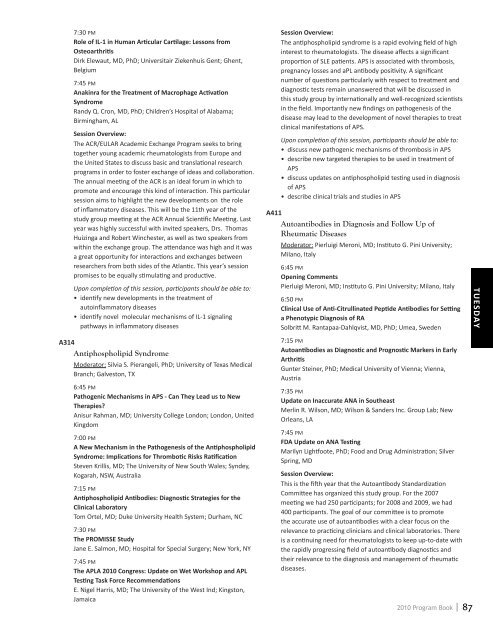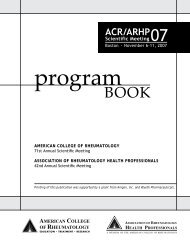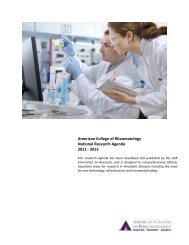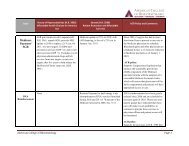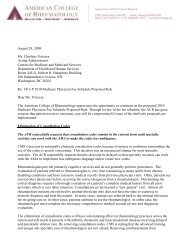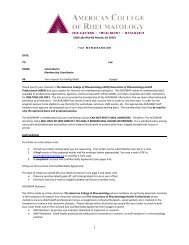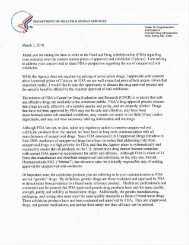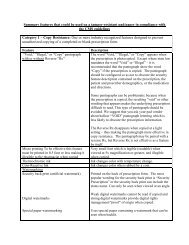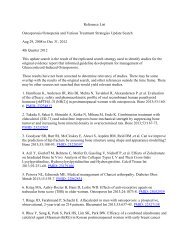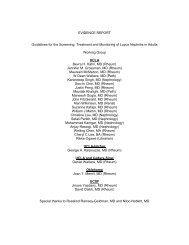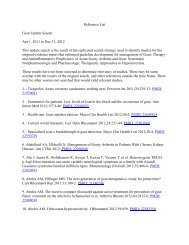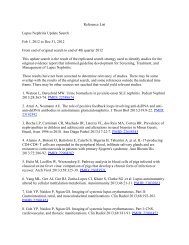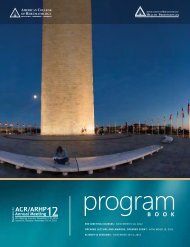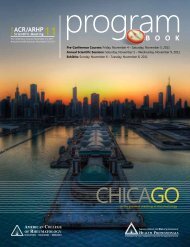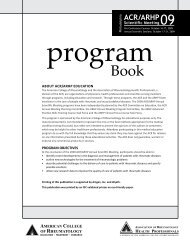B O O K - American College of Rheumatology
B O O K - American College of Rheumatology
B O O K - American College of Rheumatology
Create successful ePaper yourself
Turn your PDF publications into a flip-book with our unique Google optimized e-Paper software.
7:30 PM<br />
Role <strong>of</strong> IL-1 in Human Articular Cartilage: Lessons from<br />
Osteoarthritis<br />
Dirk Elewaut, MD, PhD; Universitair Ziekenhuis Gent; Ghent,<br />
Belgium<br />
7:45 PM<br />
Anakinra for the Treatment <strong>of</strong> Macrophage Activation<br />
Syndrome<br />
Randy Q. Cron, MD, PhD; Children’s Hospital <strong>of</strong> Alabama;<br />
Birmingham, AL<br />
Session Overview:<br />
The ACR/EULAR Academic Exchange Program seeks to bring<br />
together young academic rheumatologists from Europe and<br />
the United States to discuss basic and translational research<br />
programs in order to foster exchange <strong>of</strong> ideas and collaboration.<br />
The annual meeting <strong>of</strong> the ACR is an ideal forum in which to<br />
promote and encourage this kind <strong>of</strong> interaction. This particular<br />
session aims to highlight the new developments on the role<br />
<strong>of</strong> inflammatory diseases. This will be the 11th year <strong>of</strong> the<br />
study group meeting at the ACR Annual Scientific Meeting. Last<br />
year was highly successful with invited speakers, Drs. Thomas<br />
Huizinga and Robert Winchester, as well as two speakers from<br />
within the exchange group. The attendance was high and it was<br />
a great opportunity for interactions and exchanges between<br />
researchers from both sides <strong>of</strong> the Atlantic. This year’s session<br />
promises to be equally stimulating and productive.<br />
Upon completion <strong>of</strong> this session, participants should be able to:<br />
• identify new developments in the treatment <strong>of</strong><br />
autoinflammatory diseases<br />
• identify novel molecular mechanisms <strong>of</strong> IL-1 signaling<br />
pathways in inflammatory diseases<br />
Session Overview:<br />
The antiphospholipid syndrome is a rapid evolving field <strong>of</strong> high<br />
interest to rheumatologists. The disease affects a significant<br />
proportion <strong>of</strong> SLE patients. APS is associated with thrombosis,<br />
pregnancy losses and aPL antibody positivity. A significant<br />
number <strong>of</strong> questions particularly with respect to treatment and<br />
diagnostic tests remain unanswered that will be discussed in<br />
this study group by internationally and well-recognized scientists<br />
in the field. Importantly new findings on pathogenesis <strong>of</strong> the<br />
disease may lead to the development <strong>of</strong> novel therapies to treat<br />
clinical manifestations <strong>of</strong> APS.<br />
Upon completion <strong>of</strong> this session, participants should be able to:<br />
• discuss new pathogenic mechanisms <strong>of</strong> thrombosis in APS<br />
• describe new targeted therapies to be used in treatment <strong>of</strong><br />
APS<br />
• discuss updates on antiphospholipid testing used in diagnosis<br />
<strong>of</strong> APS<br />
• describe clinical trials and studies in APS<br />
A411<br />
Autoantibodies in Diagnosis and Follow Up <strong>of</strong><br />
Rheumatic Diseases<br />
Moderator: Pierluigi Meroni, MD; Instituto G. Pini University;<br />
Milano, Italy<br />
6:45 PM<br />
Opening Comments<br />
Pierluigi Meroni, MD; Instituto G. Pini University; Milano, Italy<br />
6:50 PM<br />
Clinical Use <strong>of</strong> Anti-Citrullinated Peptide Antibodies for Setting<br />
a Phenotypic Diagnosis <strong>of</strong> RA<br />
Solbritt M. Rantapaa-Dahlqvist, MD, PhD; Umea, Sweden<br />
tuesday<br />
A314<br />
Antiphospholipid Syndrome<br />
Moderator: Silvia S. Pierangeli, PhD; University <strong>of</strong> Texas Medical<br />
Branch; Galveston, TX<br />
6:45 PM<br />
Pathogenic Mechanisms in APS - Can They Lead us to New<br />
Therapies?<br />
Anisur Rahman, MD; University <strong>College</strong> London; London, United<br />
Kingdom<br />
7:00 PM<br />
A New Mechanism in the Pathogenesis <strong>of</strong> the Antiphospholipid<br />
Syndrome: Implications for Thrombotic Risks Ratification<br />
Steven Krillis, MD; The University <strong>of</strong> New South Wales; Syndey,<br />
Kogarah, NSW, Australia<br />
7:15 PM<br />
Antiphospholipid Antibodies: Diagnostic Strategies for the<br />
Clinical Laboratory<br />
Tom Ortel, MD; Duke University Health System; Durham, NC<br />
7:30 PM<br />
The PROMISSE Study<br />
Jane E. Salmon, MD; Hospital for Special Surgery; New York, NY<br />
7:45 PM<br />
The APLA 2010 Congress: Update on Wet Workshop and APL<br />
Testing Task Force Recommendations<br />
E. Nigel Harris, MD; The University <strong>of</strong> the West Ind; Kingston,<br />
Jamaica<br />
7:15 PM<br />
Autoantibodies as Diagnostic and Prognostic Markers in Early<br />
Arthritis<br />
Gunter Steiner, PhD; Medical University <strong>of</strong> Vienna; Vienna,<br />
Austria<br />
7:35 PM<br />
Update on Inaccurate ANA in Southeast<br />
Merlin R. Wilson, MD; Wilson & Sanders Inc. Group Lab; New<br />
Orleans, LA<br />
7:45 PM<br />
FDA Update on ANA Testing<br />
Marilyn Lightfoote, PhD; Food and Drug Administration; Silver<br />
Spring, MD<br />
Session Overview:<br />
This is the fifth year that the Autoantibody Standardization<br />
Committee has organized this study group. For the 2007<br />
meeting we had 250 participants; for 2008 and 2009, we had<br />
400 participants. The goal <strong>of</strong> our committee is to promote<br />
the accurate use <strong>of</strong> autoantibodies with a clear focus on the<br />
relevance to practicing clinicians and clinical laboratories. There<br />
is a continuing need for rheumatologists to keep up-to-date with<br />
the rapidly progressing field <strong>of</strong> autoantibody diagnostics and<br />
their relevance to the diagnosis and management <strong>of</strong> rheumatic<br />
diseases.<br />
2010 Program Book 87


